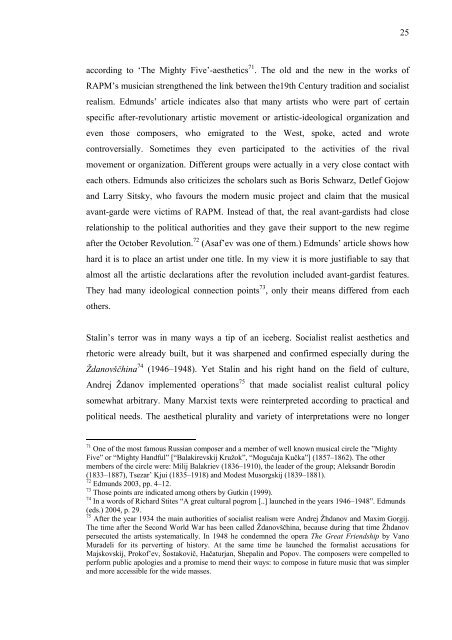Boris Asaf'ev and the Soviet Musicology - E-thesis
Boris Asaf'ev and the Soviet Musicology - E-thesis
Boris Asaf'ev and the Soviet Musicology - E-thesis
You also want an ePaper? Increase the reach of your titles
YUMPU automatically turns print PDFs into web optimized ePapers that Google loves.
according to ‘The Mighty Five’-aes<strong>the</strong>tics 71 . The old <strong>and</strong> <strong>the</strong> new in <strong>the</strong> works of<br />
RAPM’s musician streng<strong>the</strong>ned <strong>the</strong> link between <strong>the</strong>19th Century tradition <strong>and</strong> socialist<br />
realism. Edmunds’ article indicates also that many artists who were part of certain<br />
specific after-revolutionary artistic movement or artistic-ideological organization <strong>and</strong><br />
even those composers, who emigrated to <strong>the</strong> West, spoke, acted <strong>and</strong> wrote<br />
controversially. Sometimes <strong>the</strong>y even participated to <strong>the</strong> activities of <strong>the</strong> rival<br />
movement or organization. Different groups were actually in a very close contact with<br />
each o<strong>the</strong>rs. Edmunds also criticizes <strong>the</strong> scholars such as <strong>Boris</strong> Schwarz, Detlef Gojow<br />
<strong>and</strong> Larry Sitsky, who favours <strong>the</strong> modern music project <strong>and</strong> claim that <strong>the</strong> musical<br />
avant-garde were victims of RAPM. Instead of that, <strong>the</strong> real avant-gardists had close<br />
relationship to <strong>the</strong> political authorities <strong>and</strong> <strong>the</strong>y gave <strong>the</strong>ir support to <strong>the</strong> new regime<br />
after <strong>the</strong> October Revolution. 72 (Asaf’ev was one of <strong>the</strong>m.) Edmunds’ article shows how<br />
hard it is to place an artist under one title. In my view it is more justifiable to say that<br />
almost all <strong>the</strong> artistic declarations after <strong>the</strong> revolution included avant-gardist features.<br />
They had many ideological connection points 73 , only <strong>the</strong>ir means differed from each<br />
o<strong>the</strong>rs.<br />
Stalin’s terror was in many ways a tip of an iceberg. Socialist realist aes<strong>the</strong>tics <strong>and</strong><br />
rhetoric were already built, but it was sharpened <strong>and</strong> confirmed especially during <strong>the</strong><br />
Ždanovščhina 74 (1946–1948). Yet Stalin <strong>and</strong> his right h<strong>and</strong> on <strong>the</strong> field of culture,<br />
Andrej Ždanov implemented operations 75 that made socialist realist cultural policy<br />
somewhat arbitrary. Many Marxist texts were reinterpreted according to practical <strong>and</strong><br />
political needs. The aes<strong>the</strong>tical plurality <strong>and</strong> variety of interpretations were no longer<br />
71<br />
One of <strong>the</strong> most famous Russian composer <strong>and</strong> a member of well known musical circle <strong>the</strong> ”Mighty<br />
Five” or “Mighty H<strong>and</strong>ful” [“Balakirevskij Kružok”, “Mogučaja Kučka”] (1857–1862). The o<strong>the</strong>r<br />
members of <strong>the</strong> circle were: Milij Balakriev (1836–1910), <strong>the</strong> leader of <strong>the</strong> group; Aleks<strong>and</strong>r Borodin<br />
(1833–1887), Tsezar’ Kjui (1835–1918) <strong>and</strong> Modest Musorgskij (1839–1881).<br />
72<br />
Edmunds 2003, pp. 4–12.<br />
73<br />
Those points are indicated among o<strong>the</strong>rs by Gutkin (1999).<br />
74<br />
In a words of Richard Stites “A great cultural pogrom [..] launched in <strong>the</strong> years 1946–1948”. Edmunds<br />
(eds.) 2004, p. 29.<br />
75<br />
After <strong>the</strong> year 1934 <strong>the</strong> main authorities of socialist realism were Andrej Žhdanov <strong>and</strong> Maxim Gorgij.<br />
The time after <strong>the</strong> Second World War has been called Ždanovščhina, because during that time Žhdanov<br />
persecuted <strong>the</strong> artists systematically. In 1948 he condemned <strong>the</strong> opera The Great Friendship by Vano<br />
Muradeli for its perverting of history. At <strong>the</strong> same time he launched <strong>the</strong> formalist accusations for<br />
Majskovskij, Prokof’ev, Šostakovič, Hačaturjan, Shepalin <strong>and</strong> Popov. The composers were compelled to<br />
perform public apologies <strong>and</strong> a promise to mend <strong>the</strong>ir ways: to compose in future music that was simpler<br />
<strong>and</strong> more accessible for <strong>the</strong> wide masses.<br />
25

















